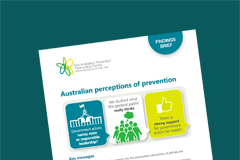Australian perceptions of prevention
Our survey and focus groups on how the community perceives government action on prevention found people’s views are more nuanced than a simplistic ‘nanny state vs freedom’ argument. Download the Findings Brief PDF for a summary of the survey's key findings and relevance for policy and practice.
Key messages
- In Australia, there has been little research into the community’s perceptions of policies and programs to prevent lifestyle-related chronic disease.
- We conducted a survey and focus groups to find out how the community perceives government action on prevention and whether it’s commonly seen to be ‘nanny state’.
- We found people’s views are more nuanced than a simplistic ‘nanny state vs freedom’ argument.
- People can simultaneously hold contradictory views, depending on the target of the intervention, the risk factor being addressed and how the intervention is implemented.
- A majority reported the government had not gone far enough in restricting advertising of unhealthy foods to children, setting salt limits on processed food and putting health ratings on packaged food.
- Although most people think personal responsibility for health is important, it does not preclude a role for government in helping people stay healthy.
- Alternative ways of conceiving the government’s role in health, other than the nanny state, include as a wise investor of taxpayer money, leader for healthy behaviour, and a partner in prevention.
- These findings show it is important not to let debate about new policy and legislation to be hijacked by nanny state arguments.
- To align better with community perceptions of prevention, it would be more helpful to reframe the debate to focus on the cost benefit, equity, the influence of vested interests and the likely effects of both action and inaction.
Associated content
-
Australian Perceptions of Prevention Survey – Technical Report, July 2016
Resource category:Reports
Date
